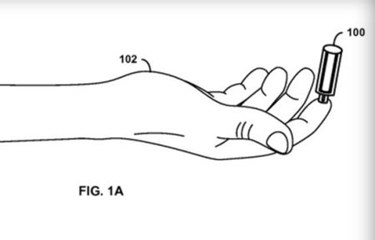Google Files Patent For Needle-Free Blood Draw Device
By Jof Enriquez,
Follow me on Twitter @jofenriq

Google Life Sciences has filed a patent for a needle-free blood draw device, in what could be the latest addition to its growing list of projects pushing the frontiers of the medtech and healthcare fields.
A pending patent application published recently by the U.S. Patent and Trademark Office (USPTO) describes a device consisting of an accelerator barrel housed within a negative pressure barrel and fixed to a cylindrical housing. The chamber in the housing is filled with pressurized gas which, upon the release of a trigger valve, pushes a micro-particle with enough force to pierce the skin and collect tiny amounts of blood, which are then sucked up into the negative pressure barrel. The micro-particle is comprised of an agglomeration of nanoparticles bound together with a biodegradable matrix made of polylactic-co-glycolic acid.
Further, "the micro-emergence of blood can be of sufficient volume for a variety of medical blood analysis tests. In one example, the device could be hand-held, and comparable in size and form factor to a pencil or conventional hypodermic needle-carrying barrel. In another example, the device could be wearable, for instance attached to a wristband, and comparable in size and form factor to a small electronic device, such as USB flash memory drive. Other sizes and form factors are possible as well."
In possible embodiments of the device, "it can be held against, or just above, the skin of the finger or wrist" or "could be applied at other parts or locations of a person for needle-free blood draw (or for delivery of medications or therapeutic monitoring substances)," according to the filing.
Technology companies are known to file numerous patents, yet these patents do not necessarily translate to commercial products, even after years of development. A Google spokesperson told The Verge via e-mail: "we hold patents on a variety of ideas — some of those ideas later mature into real products or services, some don't. Prospective product announcements should not necessarily be inferred from our patents."
Google Lifesciences — which recently became a standalone company after Google's transformation into Alphabet — has gained plentiful attention from the biomedical and medtech communities for the group's cutting-edge projects. Technologies being developed by their engineers include a smart contact lens, a cancer-detecting wearable device, a surgical laser ablation system, and the Baseline study.
Substantial aspects of these endeavors — Baseline, in particular — involve collecting loads of health information and applying data science to look for patterns in disease development over time.
"We’ll try to understand the fundamental building blocks — the systems biology for what it means to be free of overt disease, what we call “healthy.” Then we’ll follow people to try to capture the early signs of that transition, with the goal of trying to prevent disease as we go forward," explains Baseline study lead and Google Life Sciences medical director Dr. Jessica Mega, in an interview with STAT.
She says her team is "trying to combine deep molecular data, clinical data, imaging data and patient engagement" and aims to apply their insights beyond the Baseline study.
"That’s something I think places like Google and Google Life Sciences will be particularly good at — using machine-learning algorithms and trying to come up with new observations," she says in the interview.
According to Mega, they are trying to empower patients by giving them the ability to get the right treatment early in the disease process and avoid hospitalizations and unnecessary tests. If a test is needed, then newer diagnostics tools and devices that do not bring as much discomfort to patients could be the new standard, if Google has its way.
"People don’t want a lot of unnecessary, expensive, cumbersome, inaccurate tests. But we’re working to come up with things that provide actionable information. People ask if this will be something that only a handful of people can use. The hope is that they will be scalable. We’re a bit early in that mission, but it’s something we take seriously," Mega says in the interview.
